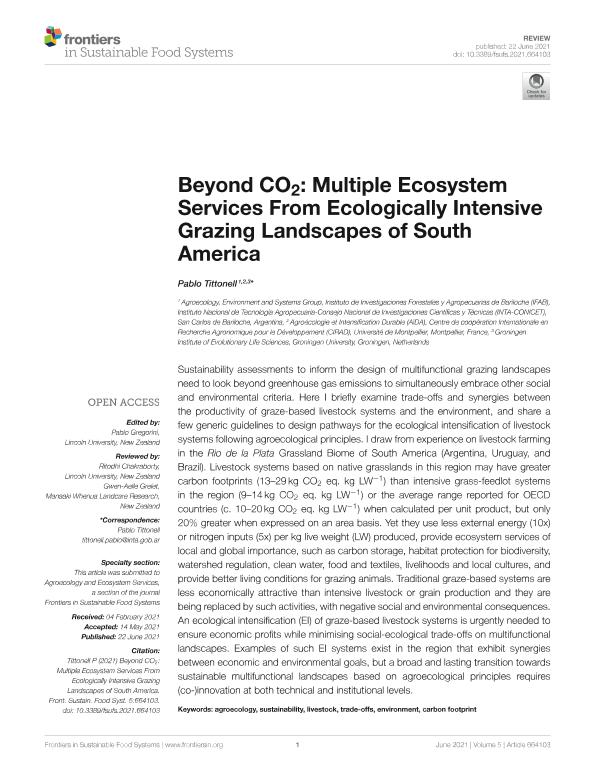Artículo
Beyond CO2: Multiple Ecosystem Services From Ecologically Intensive Grazing Landscapes of South America
Fecha de publicación:
06/2021
Editorial:
Frontiers Media
Revista:
Frontiers in Sustainable Food Systems
ISSN:
2571-581X
Idioma:
Inglés
Tipo de recurso:
Artículo publicado
Clasificación temática:
Resumen
Sustainability assessments to inform the design of multifunctional grazing landscapes need to look beyond greenhouse gas emissions to simultaneously embrace other social and environmental criteria. Here I briefly examine trade-offs and synergies between the productivity of graze-based livestock systems and the environment, and share a few generic guidelines to design pathways for the ecological intensification of livestock systems following agroecological principles. I draw from experience on livestock farming in the Rio de la Plata Grassland Biome of South America (Argentina, Uruguay, and Brazil). Livestock systems based on native grasslands in this region may have greater carbon footprints (13–29 kg CO2 eq. kg LW−1) than intensive grass-feedlot systems in the region (9–14 kg CO2 eq. kg LW−1) or the average range reported for OECD countries (c. 10–20 kg CO2 eq. kg LW−1) when calculated per unit product, but only 20% greater when expressed on an area basis. Yet they use less external energy (10x) or nitrogen inputs (5x) per kg live weight (LW) produced, provide ecosystem services of local and global importance, such as carbon storage, habitat protection for biodiversity, watershed regulation, clean water, food and textiles, livelihoods and local cultures, and provide better living conditions for grazing animals. Traditional graze-based systems are less economically attractive than intensive livestock or grain production and they are being replaced by such activities, with negative social and environmental consequences. An ecological intensification (EI) of graze-based livestock systems is urgently needed to ensure economic profits while minimising social-ecological trade-offs on multifunctional landscapes. Examples of such EI systems exist in the region that exhibit synergies between economic and environmental goals, but a broad and lasting transition towards sustainable multifunctional landscapes based on agroecological principles requires (co-)innovation at both technical and institutional levels.
Palabras clave:
AGROECOLOGY
,
CARBON FOOTPRINT
,
ENVIRONMENT
,
LIVESTOCK
,
SUSTAINABILITY
,
TRADE-OFFS
Archivos asociados
Licencia
Identificadores
Colecciones
Articulos (IFAB)
Articulos de INSTITUTO DE INVESTIGACIONES FORESTALES Y AGROPECUARIAS BARILOCHE
Articulos de INSTITUTO DE INVESTIGACIONES FORESTALES Y AGROPECUARIAS BARILOCHE
Citación
Tittonell, Pablo; Beyond CO2: Multiple Ecosystem Services From Ecologically Intensive Grazing Landscapes of South America; Frontiers Media; Frontiers in Sustainable Food Systems; 5; 6-2021; 1-11
Compartir
Altmétricas




